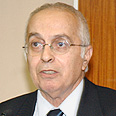
Iran befuddles West again
The Iranian's vague response to UN, US demands calling to 'renew dialog' implies that it will continue its nuclear ambitions
"The Iranians traditional mode of negotiations and their "divide and conquer" policy prevalent for the past 2,500 years, has allowed Iran to deceive the West yet again."
Professor David Menashri, head of the center for Iranian studies at Tel Aviv University, tried to explain in an interview to ynet what the Iranians really mean when they say they are "interested in entering a dialog."
It appears that no one really believed that Iran's response to the package of "unspecified incentives," in exchange for suspending uranium enrichment would be positive.
The only potent question was how would the Iranian "nay" be said – would it be vague or clear. Iran's goal to gain as much time as it can for its nuclear ambitions and to avoid international sanctions as much as possible, is clearly evident.
"Yes" quite unlikely
According to Prof. Menashri "it would have been quite unlikely for the Iranians to have provided a clear 'yes' but instead it was obvious they would give a vague answer. As is typical of the Iranians, they close the door but at the same time they open a window.
They say the package is 'a good basis for continuing dialog' and they try to discuss trivial matters rather than the core issues, and this was definitely not the intention when the proposal was offered.
"Iran was due to give its response by July 12 and it was postponed to August 31, the Iranians succeeded in gaining a month and a half. Now, the UN Security Council will have to decide whether the Iranians longwinded and vague response is a positive or a negative answer," says Prof. Menashri.
In parallel to the nuclear enrichment crisis, and perhaps purely by chance, world attention and the attention of the Security Council is focused on the developments in Lebanon. Prof. Menashri believes that the Ayatollah regime lost quite heavily in the campaign in Lebanon, when comparing it to its status prior to the war.
In a paper published this week by Prof. Menashri entitled "The Day After the Lebanon War: Iranian Power and its Limitations," Menashri noted that a series of developments prior to the war emboldened Iran and included: Strengthening of radicalism inside Iran, a reduction in the Arab countries' involvement, strengthening of the Shiite's in the Islamic world, and the loss of Iran's favorable status prior to the war, throughout which it continued its nuclear ambitions.
Gaining time on the way to nuclear capability
Since the war, Prof. Menashri notes that a series of factors are standing in the Iranians' way. He says the world has finally opened its eyes to the dangers posed by radical Islam, and even European countries are expected to come around to the US mode of thinking on this issue. Therefore, the pressure being applied on Iran regarding their nuclear plans is only expected to accelerate.
Hizbullah suffered a heavy military blow, which in turn has generated much anger towards the guerilla group and towards Iran in Lebanon; the US, Europe and even some moderate Arab countries consented to Israel's prolonged operation in Lebanon.
According to Prof. Menashri, in time these factors will demonstrate that the negative implications are no less severe than the positive implications of war for Iran.
"Moderate Sunni clerics are outraged at Iran, according to them Iran is disrupting the fine balance between the Sunnis and the Shiites. It wasn't in vain that Jordan's King Abdullah II told The Washington Post in December that Iran was seeking to create 'a Shiite crescent' in the Middle East, and that the Sunnis are profoundly concerned.
"At the same time we are witnessing several other important developments – there is anger among the people of Iran against the massive aid it has allocated to the rebuilding of Lebanon, and the regime is finding itself in an impossible situation."
And back to the nuclear issue. True, Iran faced several obstacles in Lebanon, however the main issue – Iran's nuclear development – has not been resolved and it will come back to the negotiating table in full force.
What do the Iranians intend to do about this, and how far are they willing to go? Prof. Menashri believes that Iran will ultimately achieve nuclear capability; however the question is in whose hands will this capability lie.
"After all, we must remember, the nuclear project began in the days of the Shah. However, nuclear arms in a regime such as that of Ahamdinejad, who has declared that Israel should to be wiped out, is a completely different matter."
And what will happen after the questions become clear and the sanctions are imposed against Iran? Will it respond negatively or positively?
"Iran is determined to continue its nuclear plans, but will be able to suspend it subject to an agreement. Even the Ayatollah Khomeini vowed to fight Saddam Hussein to the end, and ultimately signed an agreement with him.
"Iran has an internal problem, because no one is capable of making difficult decisions, however in general, even the greatest radicals are willing to accept a compromise if the price is too high. In such a situation, Iran would be able compromise as long as it nurtures the hope of continuing the project in the future."
Prof. Menashri sums up by saying, "the Iranian stance as reflected in its response to the Security Council was only to be expected. In general, it can be said that in Iran's case, it has been proven that the combination of a bazaar merchant and a religious cleric doesn't make a bad politician – on the contrary."










